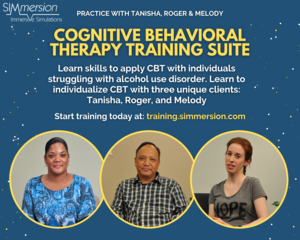
Cognitive Behavioral Therapy Training Suite
Scenario
Cognitive Behavioral Therapy (CBT) is one of the most commonly used and extensively studied treatments for substance use disorders (SUDs). CBT helps people understand and change their emotions and behaviors related to their alcohol use. After a client has been introduced to CBT, a therapist will need to do a Functional Analysis. This analysis is key in helping a client understand potential patterns in their drinking habits. Once the connection between thoughts, feelings, and behaviors is complete, it is helpful to begin discussing a change in drinking behaviors. An effective change plan is key to helping a client maintain change in their alcohol use. Understanding how to apply these skills for a client's individual needs can make a great impact on their success in sustaining change.
The Cognitive Behavioral Therapy Training Suite includes access to three virtual client training simulations:
Introducing Cognitive Behavioral Therapy with Tanisha Mosley: Tanisha Mosley is new to therapy and is looking for ways to cut back on her drinking and reduce her stress. Work together with Tanisha and show how Cognitive Behavioral Therapy can be used to help change her drinking habits. After the session, review feedback on how well you introduced the basics of CBT, developed a collaborative relationship, and created a CBT plan that works for her needs and goals.
Functional Analysis with Roger Ellison: Roger Ellison has been working through Cognitive Behavioral Therapy techniques to help reduce his drinking. In this session, help him fill out a self-monitoring record and examine a recent drinking episode to show how thoughts, feelings, and events interact with each other during an episode. After the session, review feedback on the effectiveness of the functional analysis and how well you utilized CBT concepts.
Creating a Change Plan with Melody Denison: Melody Denison has agreed to use Cognitive Behavioral Therapy to reduce her drinking. In this session, identify her motivations and barriers for change and develop an individualized change plan to help her reduce her drinking habits. After the session, review feedback on how well you utilized CBT concepts, developed a collaborative relationship, and built a change plan tailored to her needs.
While each program can be used independently of the others, they were built together to provide practice in effectively utilizing CBT interventions with individuals struggling with alcohol abuse.
Users
Healthcare,
Social Work & Students
Recommended Plays
3 - 8 minimum per simulation
Average Time
per Session
15 - 45
minutes per simulation
Each virtual client has 3 character versions based on common engagement levels to use CBT, thoughts and feelings toward drinking, and motivations and barriers for change. Tanisha, Roger, & Melody provide a varied training experience to prepare learners to utilize CBT interventions with clients struggling with alcohol use disorder.
Teaching Objectives:
- Discussing Topics for Introducing CBT
- Utilizing Core CBT Concepts to Structure the Conversation
- Discussing Functional Analysis Topics
- Developing a Collaborative Relationship
- Discussing Topics for Creating a Change Plan
Included in Training:
- A Training Guide on the Cognitive Behavioral Therapy process and how to use it as a cohesive and effective therapeutic strategy with clients.
- Three Simulated Conversations with a varied character to prepare learners for the different needs of clients struggling with alcohol use disorder.
- Comprehensive Feedback during and after each play to help guide skill development.
This training was developed in collaboration with Binghamton University, Brown University, and Yale School of Medicine with funding from The National Institute of Alcohol Abuse and Alcoholism (Grant Number: #R44 AA023719).
Research
Mastroleo, N., Humm, L., Williams, C., Kiluk, B., Hoadley, A., & Magill, M. (2020). Initial testing of a computer-based simulation training module to support clinicians' acquisition of CBT skills for substance use disorder treatment. Journal Of Substance Abuse Treatment, 114, 108014. doi: 10.1016/j.jsat.2020.108014. Read More
Smith, M. J., Bornheimer, L. A., Li, J., Blajeski, S., Hiltz, B., Fisher, D. J., Check, K., & Ruffolo, M. (2020). Computerized clinical training simulations with virtual clients abusing alcohol: Initial feasibility, acceptability, and effectiveness. Clinical Social Work Journal. Read More


